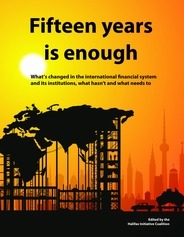CTV Power Play Interview on Bill C-300
Interview with Karyn Keenan, Halifax Initiative Program Officer and Gordon Peeling, President of the Mining Associati
Interview with Karyn Keenan, Halifax Initiative Program Officer and Gordon Peeling, President of the Mining Associati
Bill C-300: Narrow Defeat despite Widespread Support for Mining Accountability and Human Rights
Ottawa, October 28th, 2010 - The Canadian Network on Corporate Accountability (CNCA) deeply regrets the defeat of Private Member’s Bill C-300, The Responsible Mining Bill, at third and final reading in the House of Commons. The Bill lost by a narrow margin of 140 to 134.
The North American Congress on Latin America (NACLA) recently devoted an edition of its magazine Report on the Americas to Canadian foreign policy in Latin America. The Canadian edition features an article by HI's Program Officer on Canadian mining investment in the region. The article describes recent efforts to reform domestic policy and law regarding the overseas operations of Canadian extractive companies. It focuses on current initiatives that seek to create accountability mechanisms for several government agencies that facilitate Canadian mining, oil and gas investments in the global South.
To read the article click here.
To access the article in Spanish click here.
Financial Transaction Tax feasible, says report
Fred P. Hochberg
President
Export-Import Bank of the United States
Washington, D.C.
[Via e-mail]
May 10, 2010
Re: Pascua Lama
Dear President Hochberg,
It has come to our attention that the Ex-Im Bank has received a request to finance the binational Pascua Lama mine. We are writing to strongly urge that the Ex-Im Bank reject financing for the Pascua Lama mine.
IMF, European Union look to bail out Greece
Greece’s debt crisis is finally coming to a head, with International Monetary Fund (IMF) loans to deal with the country’s deficit and heavy debt load being hammered out in Athens. The European Union and the IMF are negotiating the terms of a bailout as fears mount that Greece’s crisis could soon spread to other countries in Europe and beyond. Other nations carrying significant debt loads, including the United States, are concerned that the Greek crisis is a harbinger of things to come, closer to home.
 What’s changed in the international financial system and its institutions, what hasn’t and what needs to
What’s changed in the international financial system and its institutions, what hasn’t and what needs toExecutive Summary
Back in 1995, the G7 met in Halifax during a “time of change and opportunity.” The meeting took place in a context of mounting deficits and debt crises in countries in the South; in the wake of economic collapse in Mexico; and amid strong global criticism from civil society, the media and governments about the World Bank and International Monetary Fund’s (IMF) austere neo-liberal structural adjustment policies.
A lot has changed since then, partly in response to the Halifax G7 Summit and subsequent G7 and G8 meetings. Too many of these improvements, however, exist only on paper. Beyond the surface, the neo-liberal, market-oriented bias that guides the Bank and Fund’s agenda and thinking has not altered.
The 2010 G8 Summit in Toronto in 2010 takes place during another “time of change and opportunity.” The financial crisis has spurred many civil society organizations (CSOs) to insist on far-reaching changes to the global financial system and its institutions. Clearly, as this publication will illustrate, 15 years of refusing to deal with the manifest shortcomings of the global economic system is enough.
The corporate responsibilty to respect human rights
Detractors of Private Member’s Bill C-300 (IU February 2009) draw attention to the bill’s treatment of human rights. The bill establishes guidelines for Canadian extractive companies that operate overseas. These guidelines must be met by companies that receive support from Export Development Canada, the Canadian Pension Plan and Canadian embassies. The guidelines are to include provisions based on Canada's international human rights obligations.
Brussels, 26 March 2010
Mr. Steve Tvardik
Head, Export Credits
Organization for Economic Cooperation and Development
Paris, France
Dear Mr. Tvardik,
Thank you for the opportunity to provide comments on the on-going review of the Sector Understanding on Export Credits for Renewable Energies and Water Projects (Sector Understanding) by the Participants to the Arrangement on Officially Supported Export Credits (Participants).
We have outlined our comments starting with our overall concern about ECA financing of fossil fuels and then following this up with specific inputs to sections of the Sector Understanding. It ends with a short conclusion bringing together the main issues to concentrate on.
Overall Issue: The need to end fossil fuel financing